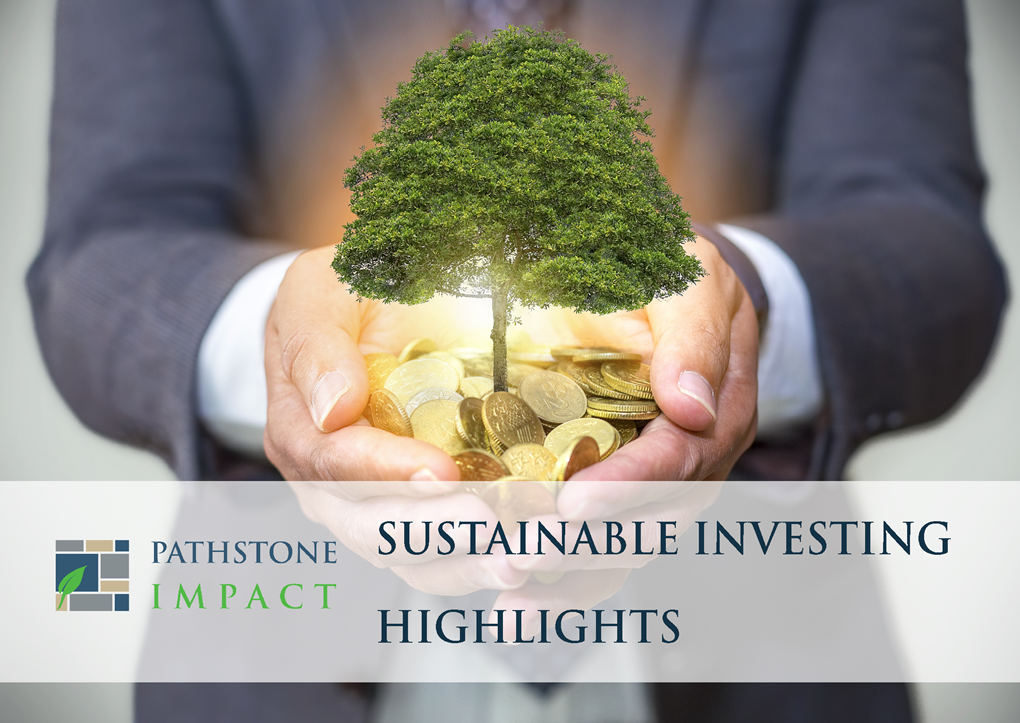Bank of England Governor warns that firms ignoring climate risk will go insolvent
The current Governor of the Bank of England, Mark Carney, has warned that companies not actively moving towards carbon neutrality would be penalized by socially conscious investors.
In a Guardian News article by Damian Carrington, Mark Carney stated that it was possible that the global transition to a lower carbon economy, which is needed to tackle the climate crisis, could result in an abrupt financial collapse. The longer it takes to reduce greenhouse gas emissions, the greater the risk of collapse. This statement comes at a time when substantial capital investments and constructive economic policies are needed to prevent an economic slowdown triggered by prolonged trade tension between the United States and China, Brexit uncertainty, and climate risk.
The Bank of England has noted that inefficient climate risk adjustment could wipe out $20 trillion (£16 trillion) in investment assets, while rewarding astute investors that adjust wisely.
New wind and solar cheaper than new coal and gas plants in areas with 2/3 of the global population
The renewable energy sector, comprised of new photovoltaic panels (PVs) and onshore wind power plants, has continued to experience a substantial cost decline in some parts of Europe, California, and China. This price drop is coming at the time climate risk is a heightened challenge for investors, companies, and intergovernmental organizations.
A Business Green article by James Murray noted that the BloombergNEF Levelized Cost of Electricity (LCOE) update reveals that the renewable energy sector continues to outpace its competitors in terms of price competitiveness, providing a cheaper source of energy when compared with coal and gas power plants.
The sharp drop in the price of PVs is linked to the dominance and scale of low-cost Chinese production, while the decline in the price of wind energy is tied to the continuing fall in the price per kWh of larger and more efficient wind turbines.
PacifiCorps is an example of a utility company actively working towards becoming carbon neutral by 2030 through substantial investment in renewable energy; solar and wind in Washington State.
A news article by Hal Bernton describes PacifiCorps plan to invest in new energy opportunities through a gradual shift from energy production powered by coal.
The State of Massachusetts accuses Exxon of hiding “catastrophic” evidence on climate change
The Attorney General for Massachusetts, Maura Healey, sued Exxon Mobil Corp for intentionally hiding its primary knowledge on the imminent financial impact of global warming from the public and investors. The state also claimed that Exxon violated the Massachusetts Consumer Protection Act.9
A Bloomberg news article by Erik Larson cites that the lawsuits brought against Exxon by Massachusetts is tougher than the security fraud case brought against the oil giant by the State of New York under the leadership of Attorney General Barbara Underwood.
In a 205-page complaint filed in Boston, MA, Massachusetts claimed that “Exxon predicted high levels of carbon dioxide in the atmosphere as early as 1982 and effectively hid the information [..] went so far as to disregard the findings of one of its scientists, who decades ago correctly predicted the amount of CO2 in the atmosphere in 2019 and said that climate change would become catastrophic.”
According to Larson, Exxon issued a statement claiming that “the Massachusetts Attorney General’s office has filed a baseless complaint three years after announcing its politically motivated investigation, during which they have not interviewed a single Exxon Mobil employee or gathered one piece of evidence from the company. In a counterpunch, a press release from the Office of the Attorney General of Massachusetts alleged that Exxon also engaged in a greenwashing campaign, targeting consumers and drivers, in which Exxon claimed that its “Synergy,” and “Green Mobil 1” oil products are energy efficient and reduced CO2.
77 % of 35 publicly-traded companies studied by Ceres identified water stress and flooding as a material risk
A study, “Feeding Ourselves Thirsty,” conducted by Ceres, a non-profit with a focus on sustainability, has shown that water, whether too much or too little, has the potential to pose a material risk to publicly traded companies within the food and agriculture industry. The study of 35 publicly-traded food and agriculture companies found that 77% mentioned: “water as a risk in their filings, compared with only 59% in 2017.”13 The study also found that “when water risks are not properly managed, there are higher fluctuations in price for agricultural products.” In addition, brand reputation can suffer due to public outrage over product quality and quantity.
Water risk can hit companies’ earnings hard. Ceres points out that flooding in the Midwest caused disruptions which reduced Archer Daniels Midland’s pre-tax operating profit by $50 million to $60 million, which translated into a 10% to 12% reduction in their net income in the fourth quarter of 2018.15 Ceres goes on to describe how shares of Tyson Foods, Pilgrim’s Pride Corp. and Sanderson Farms Inc. were also adversely impacted as floods disrupted planting on millions of acres of corn and soybeans, ultimately driving up the expenses for their livestock production.
Facebook won’t evaluate political ads in the U.S.
The rise of misinformation through social media platforms worries most Americans, including those within the corridors of wealth and power. Misinformation in the form of political advertisements has created debate as to whether tech giants such as Facebook would continue to host, fact-check, or censor misleading political ads. However, Facebook says it won’t police itself nor stop hosting, fact-checking, or censor misleading political ads because they feel it will violate the second amendment, and it won’t be “right for private companies to censor politicians or the news.” The need to fact-check or stop hosting political ads is coming at a time Twitter announced that it would stop accepting political ads, that “political message reach should be earned […] rather than bought.”
A New York Times opinion piece by Siva Vaidhyanathan cites that, “Mr. Zuckerberg spouts disciplined, molded public-relations pablum about how Facebook stands for openness and free speech, all the while censoring content to satisfy governments, such as Pakistan, India, and Turkey, that have heavy speech restrictions. In countries with more speech freedom, the platform downgrades and deletes content and accounts for reasons that remain mysterious […] Facebook is incapable of vetting political ads effectively and consistently on a global scale. And political ads are essential to maintaining the company’s presence in countries around the world.” Policing tech companies such as Facebook has drawn the support of Senator Elizabeth Warren, who recently criticized the company for its political ads policy. However, policing Facebook, without infringing on the second amendment, remains a clear challenge for those seeking to curtail disinformation through social media platforms.
Hurricanes keep ruining beach hotels, but investors are not losing interest
It is rare for an ocean-front resort owner to raise their room rates to offset the climate-induced financial risk linked to severe hurricanes. As resort owners count their financial losses that are due to climate risk, insurance companies have incrementally increased insurance premiums due to higher occurrences of hurricanes.
A Bloomberg opinion piece by Patrick Clark described how resort owners try to manage the financial ordeal of climate risk as hurricanes adversely impact resort areas.
According to Clark, hotel owners are now “tapping insurance markets to offset risk and paying asset prices that reflect the likelihood of future hurricanes.” However, the reoccurrence of disruptive storms and the decline in tourist patronage of resorts prone to hurricane has made it difficult for resort owners to access insurance at affordable premiums.
Melting ice redraws the world map and starts a power struggle
Global warming is melting ice across the Artic, resulting in more navigable waters, and is opening up a rush for resources across the region, an area that is thought to have abundant energy and mineral resources.
At the annual Arctic Circle Assembly event held in Iceland, the scramble for the arctic is recognized by security experts as a 21st-century battleground between western powers led by the United States, and eastern powers led by Russia and China.
According to former Iceland President, Olafur Ragnar Grimsson, as quoted in a recent Bloomberg news article by Marc Champion, “new technology and rise of Asia as a twenty-first-century source for economic growth are [the] rationale [as] to why a new world order could spring out of the arctic.”
According to Champion’s article, the melting arctic blends with the continuous pressure from Russia across the region, and may put China at a competitive advantage over the United States as China advances its long-held vision to create a “Polar Silk Road” across the arctic.
Amazon responds to increased shareholder pressure and commits to cut emissions 50% by 2030
Amazon, a consumer discretionary giant, bowed to shareholders’ pressure to commit to cutting delivery emission 50% by 2030 through its “Shipment Zero” initiative. Shareholder resolutions filed or co-filed by Amalgamated Bank, Green Century Capital Management, Trinity Health, the Sisters of the Order of St. Dominic of Grand Rapids, and facilitated by the non-profit As You Sow, voiced clear concerns as to why Amazon must reduce its carbon footprint by 2030.
A press release statement by As You Sow welcomed the development as significant progress and commitment towards “responding to shareholder concerns related to climate risk […] the company must initiate comprehensive plans to reduce emissions in alignment with the global goal of limiting global warming to 1.5 degrees Celsius to avoid climate catastrophe.”
In support of its commitment towards carbon neutrality and fulfilling its promise to its shareholders, Amazon CEO Jeff Bezos announced that the company is committed to meeting the Paris agreement as well as committed to becoming carbon neutral by 2040. This commitment includes the purchase of 100,000 electric vans and a 100% transition from fossil fuel energy sources to renewable energy.
AQR’s Lasse Pedersen calls for honesty about ESG and returns
Many investors see “ESG data” and “financial data” as separate and distinct sets of data that have separate and distinct uses and applications. They may point to an additional cost for ESG data, and suggest the benefits to an investor do not deliver sufficient compensation in the form of better returns to offset additional costs. Other investment professionals may view “ESG investing” as “investing”, with ESG data providing material insights into a company’s prospective upside opportunity and its downside risk.
At an AQR Capital Management conference in London, Lasse Pedersen, a financial economist and principal at AQR, presented a paper where he argued that the way to winning arguments related to environmental, social, and governance (ESG) investing is to be honest about the cost and benefits associated with ESG as a whole.
According to Pedersen, “ESG constraints could reduce the Sharpe ratio – a measure of risk-adjusted performance – when the investor had another objective, but some ESG information could be good for returns […], and ESG information could also serve as return-enhancers.”
Pedersen went further to cite that having a constrained ESG portfolio would diminish returns, however, investors surveyed by NN Investment Partners are willing to give up investment return to “support ESG or responsible investing goals.”
The future of ESG data
An article from Generation Investment Management by Felix Preston provided an overview of trends actively shaping the environmental, social, and governance (ESG) investing landscape.
Preston held a belief that robust ESG data has the potential to tailor ESG investment in the right direction while making a sound investment decision. Although ESG data still has limitations, he feels they are to some extent surmountable.
According to Preston, innovation would enable “remote sensing and exogenous disclosure,” the advancement of machine learning and predictive ESG, third party verification, fragmentation of companies’ ESG data into different aspects of business operations, and open up ESG data source platforms to public scrutiny.
Preston further states that the next wave of ESG data would be tailored towards the seventeen United Nations Sustainable Development Goals, addressing immediate challenges facing the global communities, and raising management accountability.
He notes that achieving robust ESG data availability is feasible when investors, data providers, and investment companies understand the current gaps within the ESG data space.
About the SDGs, Targets, and Indicators
The SDGs
The 2030 Agenda for Sustainable Development, adopted by all United Nations Member States in 2015, provides a shared blueprint for peace and prosperity for people and the planet, now and into the future. At its heart are the 17 Sustainable Development Goals (SDGs), which are an urgent call for action by all countries – developed and developing – in a global partnership. They recognize that ending poverty and other deprivations must go hand-in-hand with strategies that improve health and education, reduce inequality, and spur economic growth – all while tackling climate change and working to preserve our oceans and forests.
Targets
The SDGs targets are set to be achieved by 2030. There are approximately 169 targets covering a broad range of sustainable development issues.
Indicators
The SDGs indicators are used to measure progress made by the United Nations member states towards the achievement of SDGs targets. There are approximately 232 indicators set by the United Nations to measure SDGs progress.
The information provided in this commentary is intended to be educational in nature and not advice relative to any investment or portfolio offered through Pathstone. The views expressed in this commentary reflect the opinion of the author based on data available as of the date this commentary was written and is subject to change without notice. This commentary is not a complete analysis of any sector, industry or security. Individual investors should consult with their financial advisor before implementing changes in their portfolio based on opinions expressed. The information provided in this commentary is not a solicitation for the investment management services of Pathstone. The graphs and tables included herein have been provided by commercial databases and, while we believe the information to be reliable, we assume no responsibility for any error or omission. The recipients of this communication assume all risks in relying on the information set forth herein. Past performance of any investment, industry, asset class or investment strategy is no guarantee of future performance.
Please see the PDF version of this article for a full list of sources.







